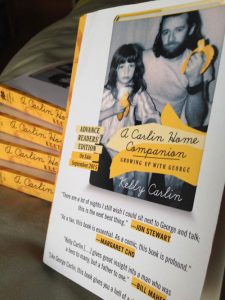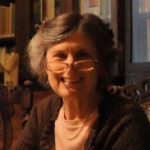
 Who is Kelly Carlin? Tell us about your work:
Who is Kelly Carlin? Tell us about your work:
I am a storyteller, podcaster, and now I’m jumping back into the world of teaching.
From 2011-2016 I toured my solo show, “A Carlin Home Companion: Growing up with George,” which was an amazing process of discovering my ability to write, perform, and survive being in the spotlight. My memoir of the same title was published by St. Martin’s Press in 2015. It was a dream come true. I’d been wanting to write my story for a large audience since 2000.
My podcast, “Waking from the American Dream,” has been a constant in my life the last 7 years, and the place that I have found a way to share my voice and passions, delving into psychology, spirituality, creative process and the big questions that shape our human lives.
How/Why did you get into this line of work?
Ever since I was little, I knew I wanted to be talking to people while on a stage or some other public forum. Growing up at the feet of my father, George Carlin, speaking his mind on a stage may have had something to do with that. LOL.
What is most rewarding about it; what makes it all worthwhile?
When I see that a story I’ve told or an idea or aspect of life that I am wrestling with lands on people in a way that helps them feel less alone and more connected to themselves, or helps them create clarity or an open heart, I feel that maybe there’s some purpose to all of this randomness that life offers.
What are the most critical problems faced?
Self-doubt. I’ve always been someone who doubts my ability, purpose, or usefulness in the world. Getting a chance to fully step into learning my craft as a writer and stage performer helped me to face demons I’ve had since my teens. Can I do it? Will it have an impact? Will people feel something? The only way I could face all of that was just by doing it: finally committing 100% to my craft. And now, as I step into teaching and sharing tools, approaches, and perspectives that have helped me not only to find my creative voice/path, but have also kept me grounded, in relationship with the unknown, and open to the imagination, there are new problems to face. Some of those are keeping an eye on my ego so that it doesn’t get in the way of being of service, trusting that I know enough. I guess, ultimately though, I face the recurring challenge of self-doubt.
Has there been a defining moment your life that made you decide to take the direction that you did?
Certainly. After my father died in 2008, I walked away from life-coaching and workshop-leading to step fully into my role as an artist. I took a huge risk; but at age 45, I knew it was now or never. And even more than the creative aspect of all that, I knew that I had to face being my “father’s daughter,” in the full shine of the spotlight in order to take the next step of my individuation process – whatever that ended up being.
If we’re sitting here a year from now celebrating what a great year it’s been for you, what would be your “dream” achievement?
Really, I’d love to become the “Oprah that says, ‘Fuck’.” What does that look like? I would love more opportunities to share my irreverent reverence with additional speaking gigs; I’d love to see hundreds of people signing up for my online courses, and I’d love to teach people at retreat centers who are looking to find their creative courage while living a human-scaled life in these overwhelming times. I’d also love to produce a successful online TV show that highlights people who create courageously and live life out loud.
How do you keep a healthy work/life balance?
I say no to lots of things. I protect my time like a badger. I find quiet time every day where I can be fed through silence, a good book, or nature.
About Pacifica and You
What brought you to Pacifica?
Joseph Campbell and Maureen Murdock. Both, through their writing, opened my mind. Campbell introduced me to seeing the world through an archetypal approach, and Murdock inspired me with her exploration of the importance of daughters transforming their relationships with their parental imagoes so that they can move about the world and do their work with freedom.
How has your Pacifica degree served you professionally in your occupation or your vocation?
Once I knew I would not be pursuing a career as an MFT here in California, I wasn’t quite sure what direction to take. When I studied to become a certified life-coach, I was pleased to see my counseling training gave me a huge advantage in working with clients, and my practice was successful early on because of my skills. But, having a relationship with myths, the imaginal, and a willingness to go into the depths was essential to being able to write and tell my life story. I relied on my understanding of family dynamics and how we live out our personal mythologies to understand and shape my writing.
How has your degree served you personally?
Being at Pacifica was two of the best years of my life. Depth psychology has become the ground that I stand on for my own growth and understanding. The depth psychology community reminds me to see the world through a lens like no other. It shapes everything I do.
Any last thoughts/a favorite quote?
“It’s all soul.” – Junior Wells, American Blues singer.



